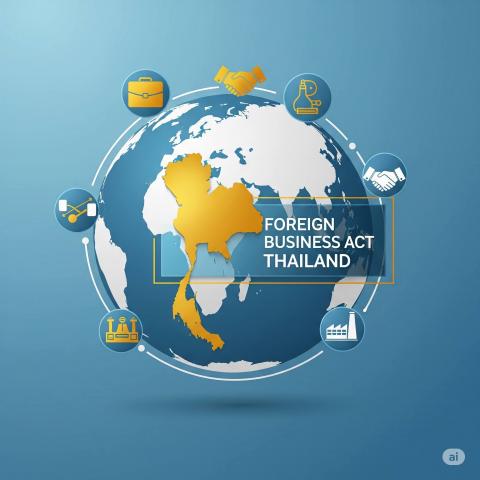For any foreigner dreaming of starting or running a business in Thailand, the Foreign Business Act (FBA), B.E. 2542 (1999) is the single most important piece of legislation to understand. It governs which business activities are open to foreign participation and which are restricted. Navigating the FBA can seem complex, but this guide will break it down into clear, simple terms.
This article explains the core principles of the FBA, the different restricted business categories, and the legal pathways for foreigners to successfully and legally operate a business in the Kingdom.
What is the Foreign Business Act (FBA)?
The Foreign Business Act is Thailand's primary law that prescribes the rights and limitations of foreign-owned businesses operating in the country. Its main purpose is to protect Thai businesses and industries in specific sectors while encouraging foreign investment in others that can benefit the Thai economy with new technology, skills, and capital.
The law defines a "foreign" company as one where 50% or more of the shares are held by non-Thai individuals or entities. It then organizes all business activities into three lists, each with different levels of restriction.
The 3 Lists: Restricted Business Categories Explained
The core of the FBA is its three lists of restricted activities. Understanding which list your intended business falls under is the first critical step.
List 1: Absolutely Prohibited Businesses
These are businesses that are strictly reserved for Thai nationals and entities. Foreigners are prohibited from engaging in these activities for "special reasons."
- Newspaper publishing, radio, or television station business
- Farming, cultivating, or animal husbandry
- Forestry and timber processing from natural forests
- Fishery in Thai territorial waters and specific economic zones
- Extraction of Thai herbs
- Trading and auctioning of Thai antiques or historical objects
List 2: Businesses Requiring Cabinet Approval
Foreigners can participate in these businesses, but only if they obtain permission from the Thai Cabinet. These activities are related to national safety, security, or have an impact on arts, culture, traditions, and natural resources.
- Production, distribution, and maintenance of firearms, ammunition, and military equipment.
- Domestic transportation by land, water, or air.
- Trading of antiques or fine arts.
- Mining, including rock blasting or crushing.
- Sugar manufacturing from sugarcane.
List 3: Businesses Requiring a Foreign Business License
This list covers businesses where Thai nationals are not yet considered ready to compete with foreign entities. Foreigners can engage in these activities but must first obtain a Foreign Business License (FBL) from the Director-General of the Department of Business Development.
- Accounting, legal, and architectural services
- Most types of construction businesses
- Retail and wholesale businesses (with certain capital exceptions)
- Selling food and beverages (restaurants)
- Hotel and tourism-related services (excluding tour guides)
- Other service businesses not specified elsewhere
How Can Foreigners Legally Operate a Restricted Business?
While the lists may seem daunting, there are several established legal pathways for foreigners to operate successfully in Thailand.
- Obtain a Foreign Business License (FBL): For businesses under List 3, the most direct route is applying for an FBL. This process involves a detailed application, a clear business plan, and demonstrating that your business will benefit Thailand's economy. Our team can help you navigate this complex application process.
- Board of Investment (BOI) Promotion: The Thailand Board of Investment offers incentives, including permission for 100% foreign ownership, for businesses in specific promoted categories. If your business brings desired technology or economic benefits, BOI company registration can be an excellent exemption from the FBA's restrictions.
- The US-Thailand Treaty of Amity: American citizens and US-based companies benefit from a special agreement. The US-Thailand Treaty of Amity allows American entities to engage in most businesses on the same basis as Thai nationals, exempting them from many FBA restrictions.
- Thai Majority Ownership: The most common structure is to form a Thai Limited Company where at least 51% of the shares are held by Thai nationals. This company is considered "Thai" and is not subject to the FBA's restrictions. However, it is crucial to ensure this is a legitimate partnership and not an illegal "nominee" arrangement.
Navigate the FBA with Confidence
Understanding the Foreign Business Act is essential for your success in Thailand. While the regulations are strict, they provide a clear framework. With the right legal strategy and guidance, you can build a thriving and compliant business in the Kingdom.
The experts at PS Law & Business specialize in helping the foreign community understand and navigate Thai corporate law. We provide clear, straightforward advice on company structuring, FBL applications, and BOI promotions to ensure your venture is built on a solid legal foundation. Contact us today for a consultation.
FAQ
What's the difference between a Foreign Business License (FBL) and a Foreign Business Certificate (FBC)?
An FBL is a license you must apply for and be granted permission to operate a List 3 business. An FBC is a certificate that confirms your right to operate under an exemption, such as the US Treaty of Amity or BOI promotion. You can learn more in our article comparing the FBL and FBC in Thailand.
Can I own 100% of my company in Thailand?
Yes, it is possible for a foreigner to own 100% of a company in Thailand if the business activity is not restricted under the FBA, or if you obtain an FBL or receive an exemption through mechanisms like BOI promotion.
Is a service business restricted under the FBA?
Generally, yes. "Other service businesses" is a broad category under List 3, meaning most service-based companies will require a Foreign Business License or another exemption to be majority foreign-owned.
How difficult is it to get a Foreign Business License?
The process is challenging and requires a strong, well-documented application that proves a net benefit to Thailand, such as technology transfer or employment of Thai citizens. The criteria are stringent, and professional legal assistance is highly recommended.
Further Reading
- Thailand Department of Business Development (DBD) - The primary government agency responsible for the FBA.
- Thailand Board of Investment (BOI) - Information on investment promotions and incentives.




